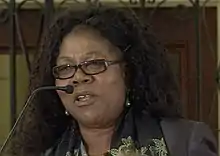Patricia Jabbeh Wesley
Patricia Jabbeh Wesley is an award-winning Liberan (African Diaspora) poet and writer and Associate Professor of English and Creative Writing at Penn State University. She is a Liberian Civil War survivor who immigrated to the United States with her family in 1991, and the author of five books of poetry.
Dr. Patricia Jabbeh Wesley | |
|---|---|
 | |
| Occupation | poet, professor |
| Education | University of Liberia (BA), Indiana University (MS), Western Michigan University (PhD) |
Biography
Jabbeh Wesley was born in Monrovia, the capital city of Liberia. She then returned to her familial village of Tugbakeh in the Maryland region for boarding school, where she learned the Grebo language after first learning English.[1] She attained her BA at the University of Liberia, her MS at Indiana University, and her PhD at Western Michigan University.[2]
Jabbeh Wesley is the author of five books of poetry: When the Wanderers Come Home, (University of Nebraska Press), Where the Road Turns (Autumn House Press), The River is Rising (Autumn House Press), Becoming Ebony (Southern Illinois University Press) and Before the Palm Could Bloom: Poems of Africa (New Issues Press). She is also the author of a children's book, In Monrovia, The River Visits the Sea.
She joined the nonprofit organization Writing For Peace because her career in writing "has been about giving voice to the voiceless in a world constantly at war." [3] She also operates her own popular blog, Patricia Jabbeh Wesley's International Blog on Poetry for Peace, in which she tries to get readers to think "about the things that bother the world."[4]
Influences and themes
Although identifying herself as African, Liberian, and Grebo, she has also been shaped by Western influences.[1] She acknowledges and accepts her hybridity of cultures as part of her identity while still calling herself a "a strong Africanist, believing in the values I was taught as an African Child."[1] Her poetry's attitude shifts between critical, bemused, revelatory, celebratory, and mournful, as she discusses both her American and Liberian lives.[1] Jabbeh Wesley constantly makes the reader aware of her exile. The vantage point of being an outsider to both the United States and postwar Liberian cultures permits a wide-awake honesty and fresh analysis of cultures, politics, gender relations, and attitudes.[1]
Jabbeh Wesley has had numerous strong mothers, including her grandmother, mother, stepmother, her polygamous father's head wife, and her mother-in-law.[1] Even though the Grebo culture is mostly patriarchal, "it is in reality a matriarchal society, where the women figures have their place as the strong pillars of community and society. Mothers are important because they actually are in charge of the homes, the children, etc., and sometimes of business."[1]
Jabbeh Wesley survived the Liberian Civil War, the event that influences and inspires most of her work. She is Christian, and her work incorporates and refers frequently to biblical themes and passages.[1]
Personal life
She currently lives with her family in west-central Pennsylvania and has taught at Pennsylvania State University and Indiana University of Pennsylvania.[2] She is a mother, raising the next generation of Liberian children far from the coast of Western Africa.[1]
Awards
- Crab Orchard Series in Poetry Winner
- Victor E. Ward Foundation Crystal Award for Contributions to Liberian Literature
- Irving S. Gilmore Emerging Artist Grant from the Arts Council of Greater Kalamazoo
- World Bank Fellowship
- 2011 President Barack Obama Award
Publications
- Before the Palm Could Bloom (1998)
- Becoming Ebony (2003)
- The River is Rising (2007)
- In Monrovia, the River Visits the Sea (2012)
Recent reviews/scholarly articles, books/interviews
https://nobelwomensinitiative.org/activist-spotlight-poet-patricia-jabbeh-wesley/
https://www.poetryfoundation.org/poets/patricia-jabbeh-wesley
https://www.youtube.com/watch?v=8eZeb8b4qVs
https://www.youtube.com/watch?v=DFLLrR06NSs
https://www.youtube.com/watch?v=Bmc9BPgH3UE
http://www.centreforafricanpoetry.org/magazine/interviews/patricia-jabbeh-wesley/
http://mmofraghana.org/uncategorized/march-poem-get-out-of-here-boys/attachment/pjwesley
http://www.calvin.edu/news/2003-04/wesley.htm
http://galatearesurrection24.blogspot.com/2015/05/two-books-by-patricia-jabbeh-wesley.html
http://www.halherring.com/files/PDF/Interviews/DreamingofHome.pdf
http://allafrica.com/stories/201410151808.html
http://www.iup.edu/magazine/page.aspx?id=43085
http://chqdaily.com/tag/patricia-jabbeh-wesley/
http://weekendamerica.publicradio.org/display/web/2008/11/29/bringing_poetry_home
http://www.eng.ntnu.edu.tw/files/writing/1921_c2ba4bfc.pdf
http://news.psu.edu/story/141051/2005/11/02/research/surviving-war-and-living-again
References
- Blessing, Carol; Jabbeh Wesley, Patricia (2010). Exile and the Narrative/Poetic Imagination. Newcastle upon Tyne: Cambridge Scholars Publishing. pp. 77–92. ISBN 1-4438-1746-5.
- "Patricia Jabbeh Wesley". Poetry Foundation. Poetry Foundation. 2017-09-30. Retrieved 2017-09-30.CS1 maint: others (link)
- "Patricia Jabbeh Wesley". Writing For Peace. 2014-09-03. Retrieved 2017-09-30.
- Jabbeh Wesley, Patricia. "Patricia Jabbeh Wesley's International Blog on Poetry for Peace". poetryforpeace.worldpress.com.
